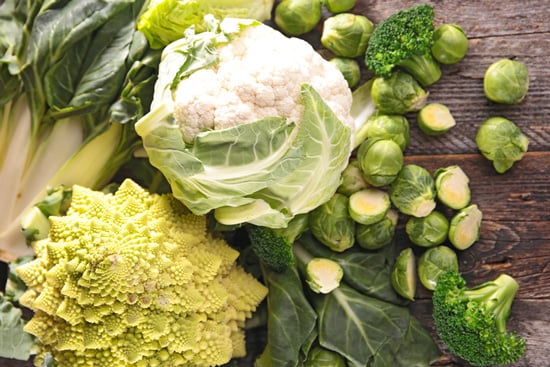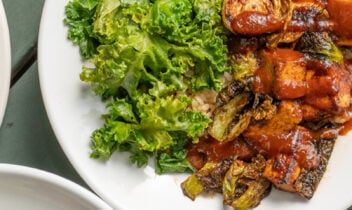About The Buzz: Understanding The Benefits of Cruciferous Vegetables

WHAT THEY’RE SAYING
Cruciferous vegetables offer health benefits that may include reducing the risk of various types of cancer in humans.1 On the other hand, animal studies have shown that consuming high amounts of these veggies may cause thyroid issues. Should humans consume cruciferous veggies, and if so, how much is enough?
WHAT THEY’RE SAYING
Cruciferous veggies include broccoli, Brussels sprouts, cabbage, cauliflower, collard greens, kale, kohlrabi, mustard, rutabaga, turnips, bok choy, and Chinese cabbage. Arugula, horseradish, radish, wasabi, and watercress are also members of the cruciferous veggie family. Due to the sulfur-containing compounds known as glucosinolates, cruciferous veggies have a strong, distinct smell and spicy, sometimes bitter, taste that many people find unappealing.
When glucosinolates come into contact with a plant enzyme called myrosinase through the act of chopping or chewing cruciferous veggies, their breakdown is accelerated, resulting in the formation of other compounds that may potentially prevent cancer. Accelerated breakdown and the production of cancer-preventing compounds can enhance the elimination of carcinogens before they have chance to damage DNA and halt the process of normal cells becoming transformed into cancer cells. Due to the potential benefits of this process, scientists are interested in the potential impact on health and cancer prevention that may result in high intakes of cruciferous veggies.
WHAT THE RESEARCH SHOWS
The positive news is that cruciferous veggie intake has repeatedly been shown to be beneficial in research studies. Overall, 67% of the 87 case-control studies on the topic found some kind of benefit between cruciferous veggie intake and cancer risk:
- Lung cancer: First and foremost, researchers found that the biggest factor contributing to lung-cancer risk was smoking. That being said, the best way to lower lung cancer risk is through smoking cessation. Overall, the results on this specific type of cancer are mixed – some studies have shown a significant reduction in lung cancer risk with cruciferous veggie intake, while other studies have shown no benefit.
- Colorectal cancer: As with lung cancer, the results are also mixed. One study showed that broccoli and Brussels sprout intake aided in the urinary excretion of carcinogens in well-done meat, suggesting a protective effect of cruciferous veggie intake on colorectal cancer risk. Other studies have also shown a protective effect, but overall most have shown no significant associations between eating these veggies and a risk reduction in colorectal cancer.
- Breast cancer: The connection between breast cancer and cruciferous veggie intake is not clear, as studies have been inconsistent, with some studies showing a benefit and while others do not. More research is needed.
- Prostate Cancer: At this point in time, epidemiological studies provide modest support that cruciferous vegetables reduce prostate cancer risk. Again, more research is needed.
Hypothyroidism
On the other hand, animal studies have demonstrated that very high intakes of cruciferous veggies can cause hypothyroidism (insufficient thyroid hormone). The breakdown of some glucosinolates may create a compound called goitrin, which interferes with thyroid hormone production, though cooking vegetables reduces goitrin. The breakdown of other glucosinolates creates compounds that compete with iodine for uptake by the thyroid gland. Insufficient iodine to the thyroid may result in hypothyroidism, a common condition in which body lacks sufficient thyroid hormone. The good news is that this issue does not arise in normal levels of cruciferous veggie intake in humans, meaning you’ve got the green light to enjoy cruciferous veggies without risk of developing hypothyroidism.
THE BOTTOM LINE
More research must be done to understand the connection and potential benefits of cruciferous veggie intake and cancer risk. Regardless, cruciferous veggies are wholesome, nutritious veggies that offer health benefits that are not limited to a potential cancer risk reduction benefit. These veggies also provide a variety of other beneficial compounds including carotenoids for healthy eyes, folate to help protect our DNA, vitamin K for healthy bones, and vitamin C for a high functioning immune system and skin, bones and teeth.2
How many servings per week should be consumed to reap health benefits without overdoing it? At this point in time, there is no separate daily intake recommendation specifically for cruciferous veggies. However, epidemiological studies suggest that adults should aim for 5 servings per week, or roughly a serving a day. Regularly consuming cruciferous veggies in addition to filling half your plate with all types of fruits and veggies during each meal and snack will help to reduce your risk of obesity, cancer and overall mortality.
7 Ways to Add Cruciferous Veggies to Your Day
- Mix arugula into your salads and pasta or sprinkle on top of homemade pizza.
- Sautée kale and add a sprinkle of salt, drizzle olive oil and Parmesan cheese. Also try massaged kale in salads or cheesy kale chips (less expensive to make at home).
- Mustard greens are a great addition to salads because they add a spicy kick. Add mustard greens to curry for a new take on a classic dish.
- Bok choy is an excellent addition to stir-fry. Top 10 Ways to Enjoy Bok Choy
- Brussels sprouts are delicious many ways – sautéed, steamed, baked, shaved into salads or added to soup. They’re also great when roasted with meat and apples.
- If you’re not sure what to do with cabbage, look no further – cabbage rolls are a delicious, nutritious and filling way to enjoy cabbage. Asian Cabbage Scramble
- For a healthier version of classic fried rice or pizza, use cauliflower instead of white rice or to make the pizza crust.
More Info
All About Cruciferous Vegetables and How to Make Them Delicious
Winter Greens (Watercress, Mustard Greens)
Video Center: Selection. Storage. Preparation.
How Many Cups Do You Need?
Key Nutrients in Fruits & Vegetables
Fruit & Veggie Database


